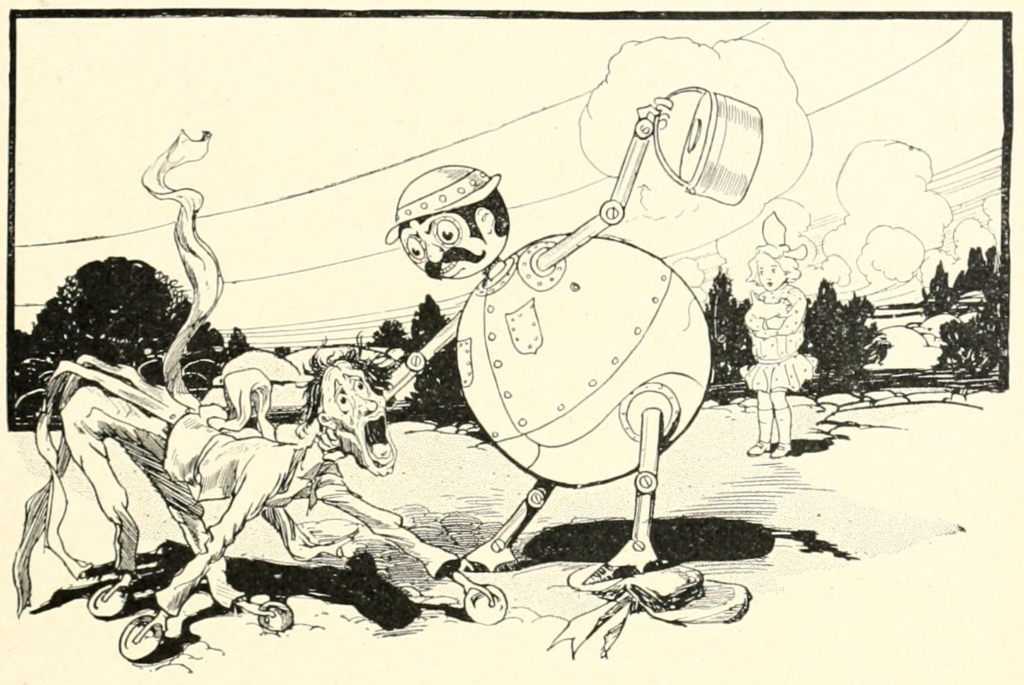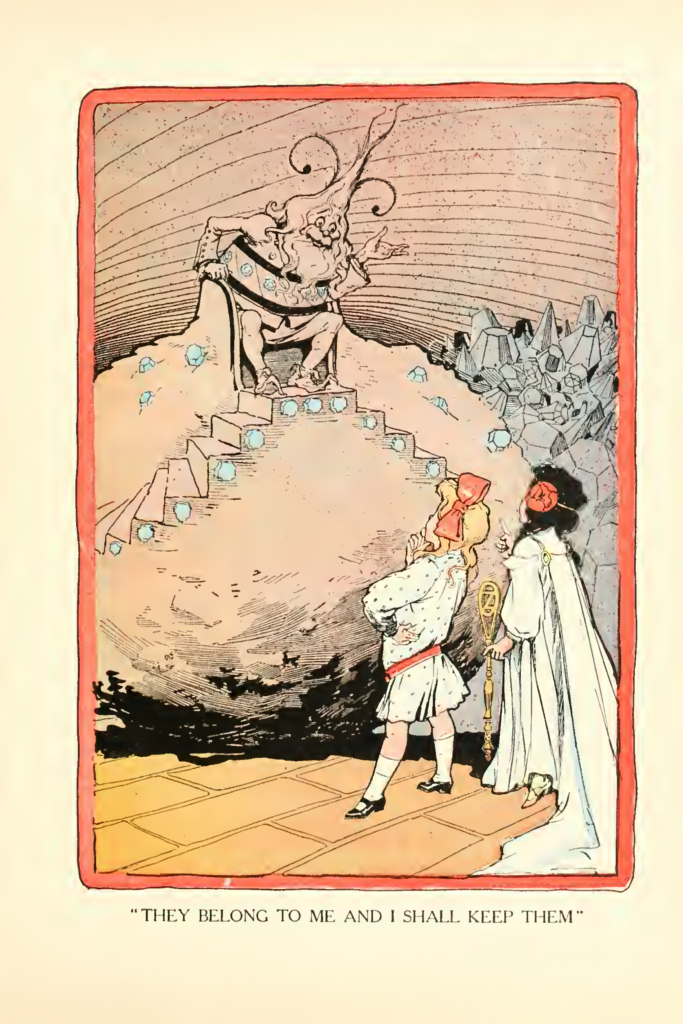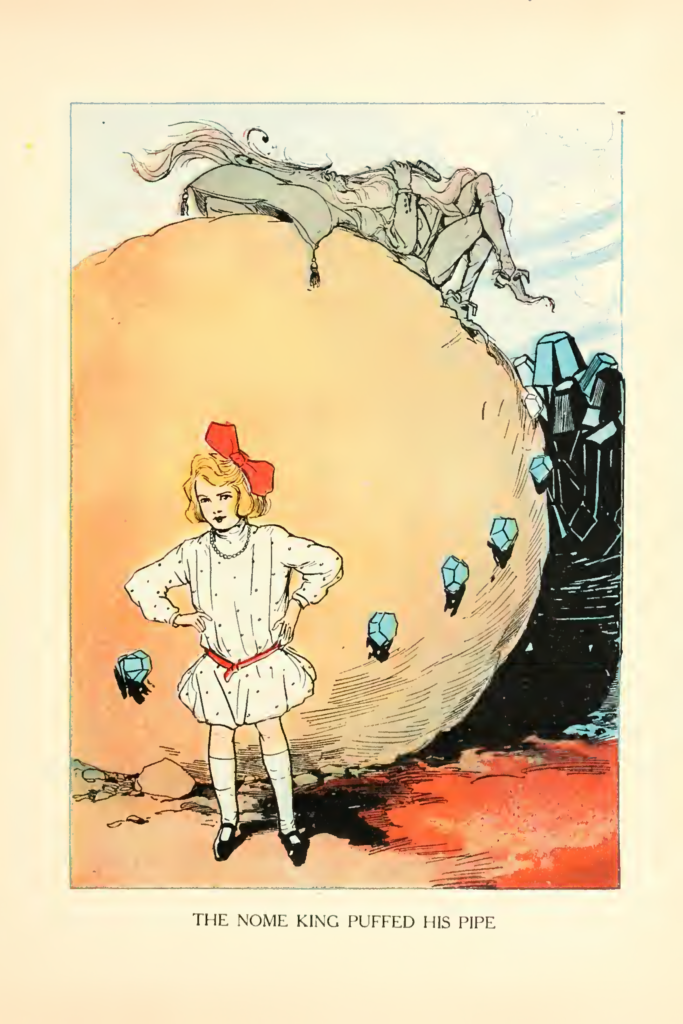However, unlike in the film, Dorothy later learns that there is more to the Wheelers. Tiktok claims, “They try to make folks be-lieve that they are ver-y ter-ri-ble, but as a mat-ter of fact the Wheel-ers are harm-less e-nough to an-y one that dares to fight them. They might try to hurt a lit-tle girl like you, per-haps, be-cause they are ver-y mis-chiev-ous” (66–67). (Baum writes all of Tiktok’s dialogue in this way to convey his robotic voice.) A Wheeler later admits his people have assumed cruel personas as a form of self-defense: “I’m not really bad, you know; but we have to pretend to be terrible in order to prevent others from attacking us” (80). Given that their neighbor was the wicked Evoldo, this seems like a reasonable precaution. The Wheelers themselves wrote “BEWARE THE WHEELERS” to scare off possible invaders.

Reprimanded for being “im-pu-dent and dis-a-gree-a-ble” (82), the Wheeler promises his people will reform. Some of them do, as in the ending, Wheelers also celebrate the return of the Royal Family: “The people shouted their approval fifteen times, and even the Wheelers, some of whom were present, loudly promised to obey the new King” (253). In the novel, when the captive Wheeler promises to behave, he means it, but in the film, as the Wheeler rolls away, he cackles, repeating “behave.” The audience understands this guy is going to do anything but. In Return to Oz, the Wheelers are cruel monster-people who serve Mombi and, in turn, the Nome King. The Wheelers remain malevolent, if pitiful, and seemingly vanish when Oz is restored. In comparison, Baum shows the Wheelers humanizing nuance.
Of course I have to talk about the Nome King. While Mombi and Jinjur do not seem evil per se, the Nome King is the single most malevolent force in Baum’s Oz novels.
The Nome King is the central antagonist of Ozma of Oz, which should really probably be entitled The Nome King. Baum devotes eight of the book’s twenty-one chapters, a little under a third of the total pages, to the battle against him. Not obviously menacing, the Nome King is a short, fat, bearded man whom Dorothy identifies with Santa Claus. The Nome King’s first lines of dialogue quote The Night Before Christmas (suggesting the Nomes are aware of Christianity). However, the Nome King’s jovial demeanor is a front for his greed and cruelty. The tone is set when, right after welcoming the comparison between himself and Santa, the Nome King has this interaction with Ozma:
“Your Majesty,” said she [Ozma], “I am the ruler of the Land of Oz, and I have come here to ask you to release the good Queen of Ev and her ten children, whom you have enchanted and hold as your prisoners.”
“Oh, no; you are mistaken about that,” replied the King. “They are not my prisoners, but my slaves, whom I purchased from the King of Ev” (165).

The Nome King, totally amicable, proceeds to counter Ozma and Dorothy’s arguments that what he did was wrong. “Cruelty,” the Nome King says, “is a thing I can’t abide. So, as slaves must work hard, and the Queen of Ev and her children were delicate and tender, I transformed them all into articles of ornament and bric-a-brac and scattered them around the various rooms of my palace” (168). Afterward, the Nome King shows off his enormous, well-armed military and industrial operations, which notably use electricity, and demonstrates that his magic is so powerful that Ozma, Dorothy, and their friends are literally incapable of hurting him. Chillingly cheerful, “his eyes twinkling merrily” (173), the Nome King challenges Ozma, Dorothy, the Scarecrow, the Tin Woodman, and their twenty-seven-man army to a game. He hates Billina, ignores the Saw-Horse, and wants the Cowardly Lion and Hungry Tiger to just leave lest they break his various treasures, so they are not included in the challenge:
“You shall go alone and unattended into my palace and examine carefully all that the rooms contain. Then you shall have permission to touch eleven different objects, pronouncing at the time the word ‘Ev,’ and if any one of them, or more than one, proves to be the transformation of the Queen of Ev or any of her ten children, then they will instantly be restored to their true forms and may leave my palace and my kingdom in your company, without any objection whatever. It is possible for you, in this way, to free the entire eleven; but if you do not guess all the objects correctly, and some of the slaves remain transformed, then each one of your friends and followers may, in turn, enter the palace and have the same privileges I grant you. […] If none of the eleven objects you touch proves to be the transformation of any of the royal family of Ev, then, instead of freeing them, you will yourself become enchanted, and transformed into an article of bric-a-brac or an ornament” (173–174).
Ozma agrees, against Dorothy’s advice, because she refuses to surrender and because she underestimates the difficulty of the task—the Nome King’s palace is enormous, and every room is packed with bric-a-brac. There follows more than a day of suspense as Dorothy and the others’ numbers are winnowed down one by one, all the while the Nome King merrily puffs on his pipe and laughs at them and Dorothy realizes they are all his prisoners. The sequence is effective mostly because of the Nome King, who is scary in that he seems to just be a rich sadistic sociopath. When his steward is angry that he is doing this instead of enchanting Ozma’s party all at once, the Nome King tells him outright that he is playing the game because it is “more fun this way” (192). The Nome King also becomes explosively angry the second he encounters adversity, eventually ditching his friendly act and “roaring” at Dorothy “like a savage beast” (227). And when he loses the game to Billina, the Nome King simply summons his army because he never really meant to let them leave. After all, each captive is another treasure for him. It teaches kids the valuable lesson that politeness and virtue are not the same.
